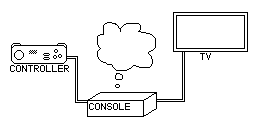Display lag
Display lag is the delay between a console producing output and a television displaying said output. In most cases, it is caused by high-resolution televisions imposing additional processing on the visual data it receives in order to make it look better. While this feature is useful for non-interactive applications, such as video playback and technical demos, it goes against the real-time nature a majority of games require, thus resulting in the illusion that there is an in-game delay between input and action.
Display lag is difficult to quantify but easy for players to detect; simply moving a pointer around the screen with a Wii Remote can reveal small amounts of display lag, while the fact that controller feedback such as rumble or the Wii U's GamePad is not delayed by the TV can also make display lag obvious to sensitive players. It can be described as similar to playing online, though at a more constant and predictable rate.
Even with small amounts of display lag, some games with stringent timing requirements (such as rhythm games) may become difficult or infeasible to succeed at. For the Super Smash Bros. series specifically, every frame of display lag essentially decreases the possible reaction time of players, increasing the amount of prediction necessary to win and widening the size of a character's safe movepool. As a result, tournaments heavily favour setups with older, CRT televisions that lack display lag, and some tournaments even provide incentives to entrants who bring in such televisions. Assuming the programming on newer televisions can be altered to prevent them from altering the image quality of input (for example, some televisions have a "game mode" intended to reduce the effect), they can also sometimes be used at tournaments, though older televisions are still preferred.

